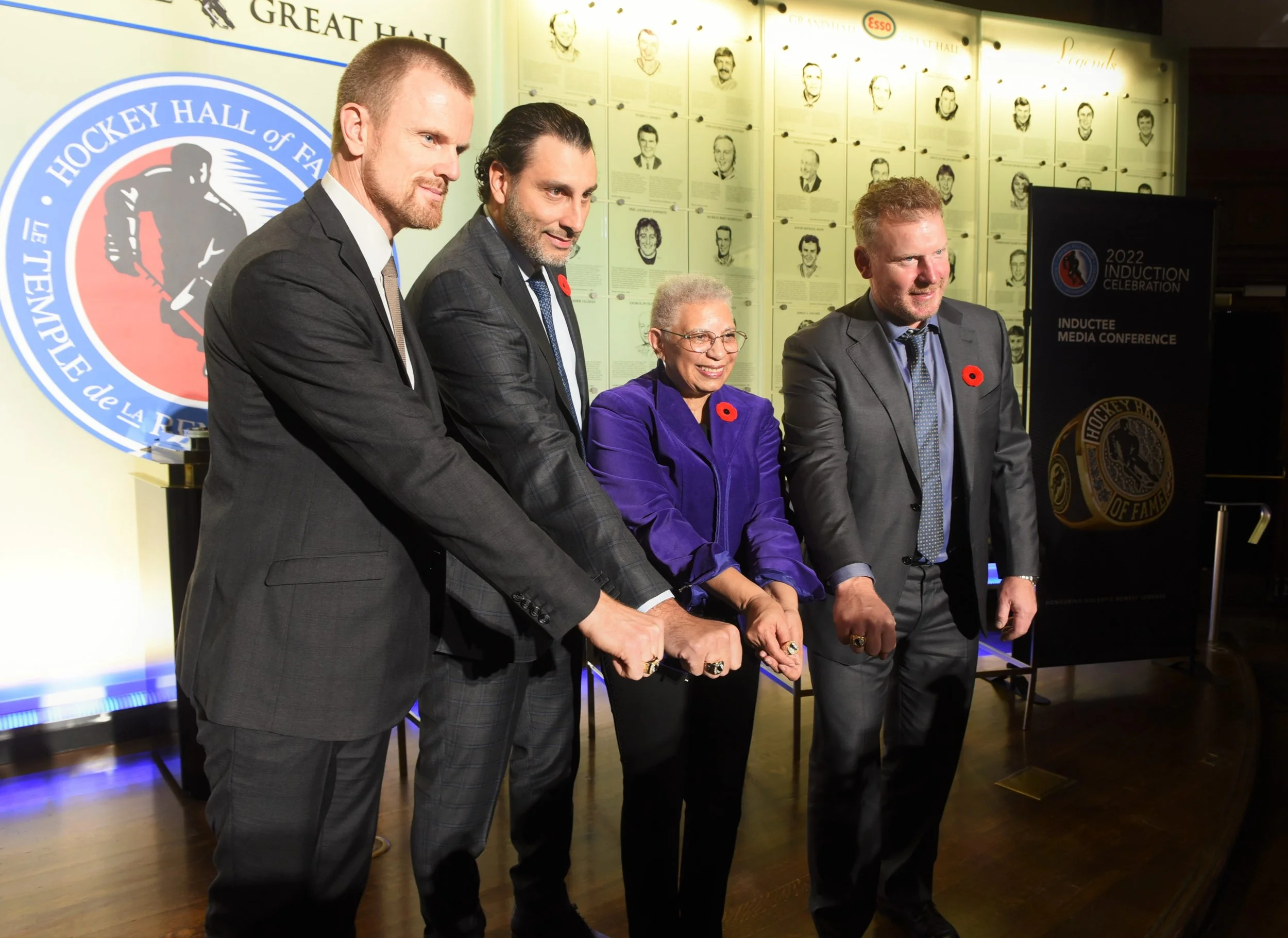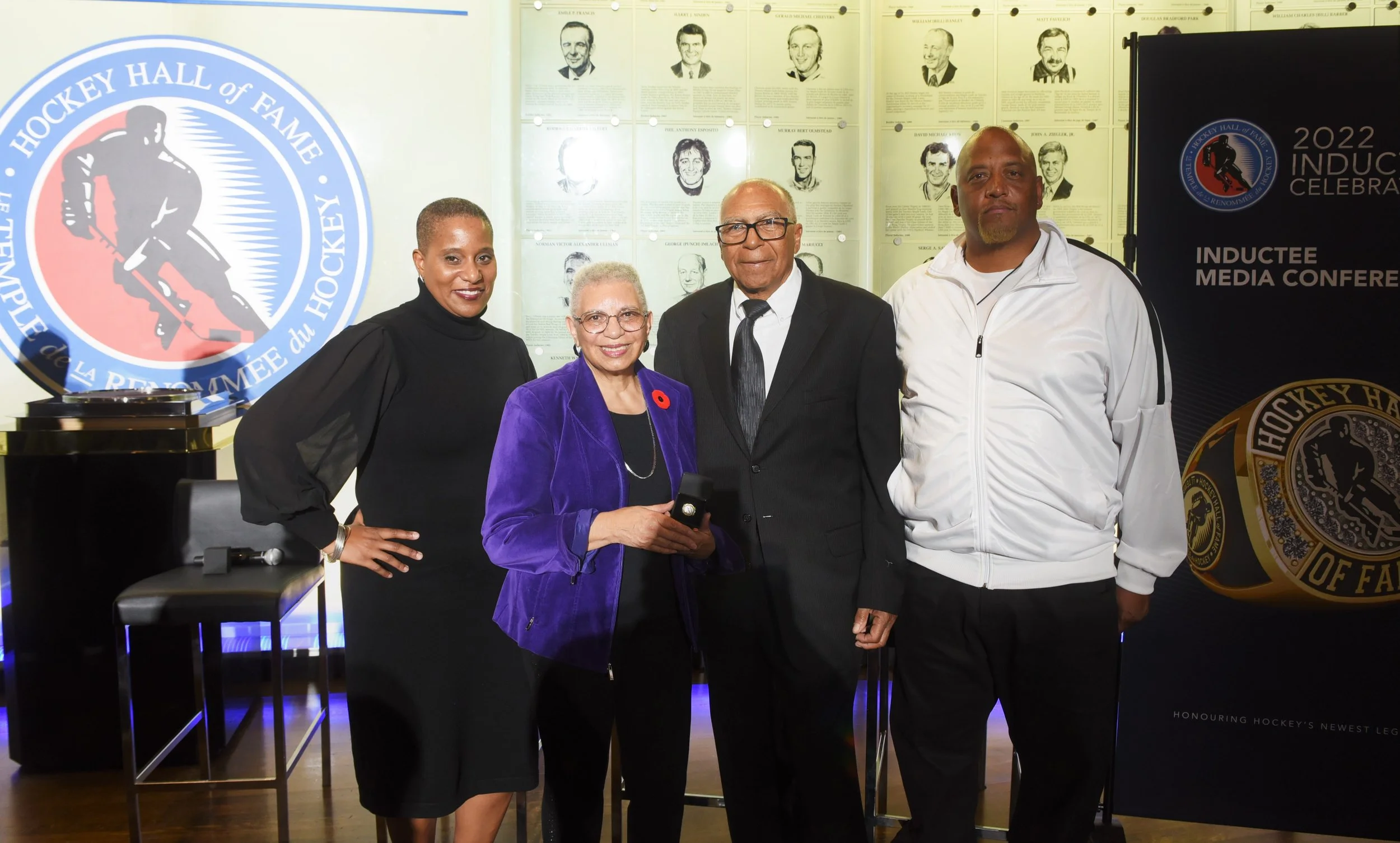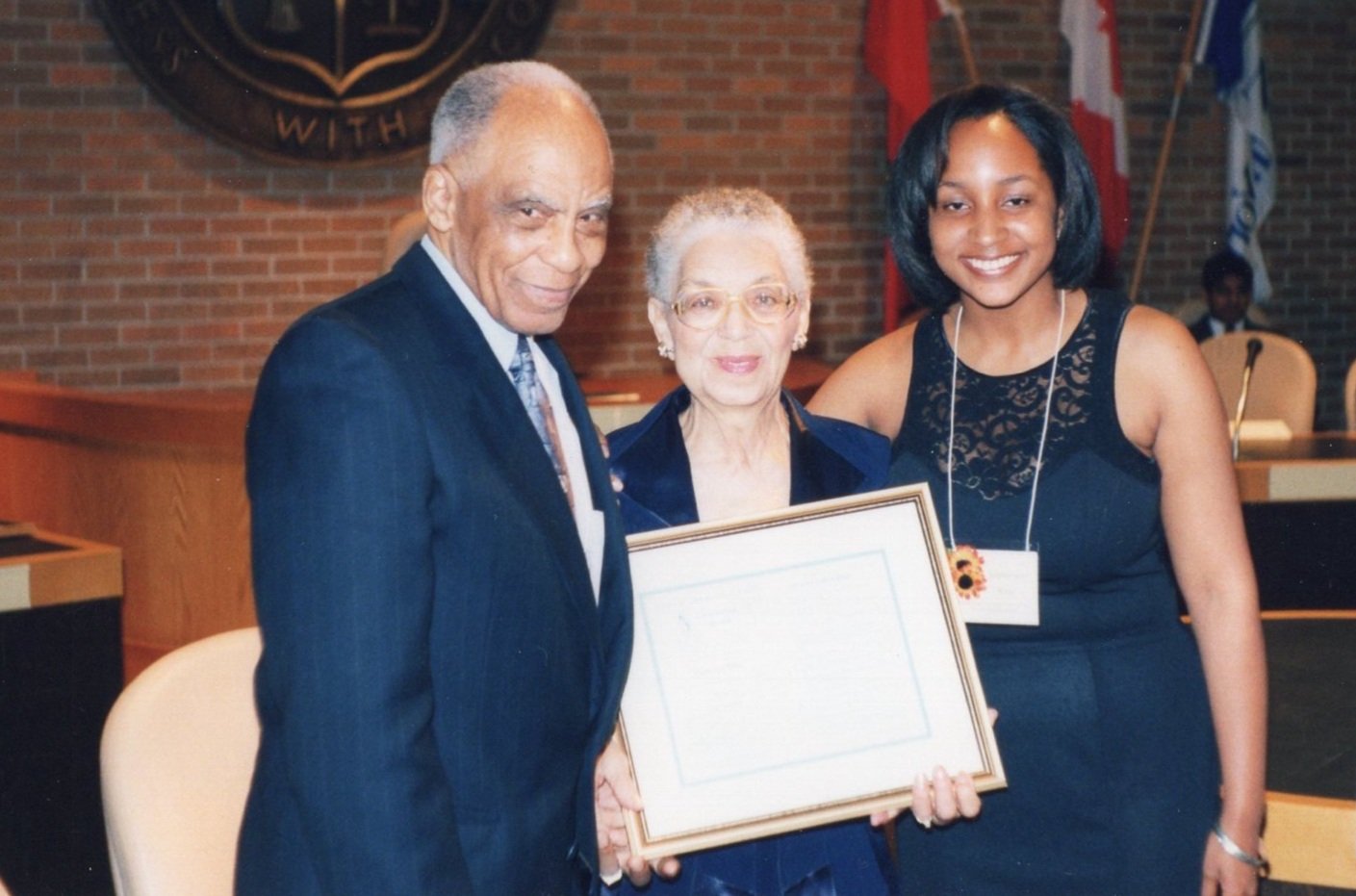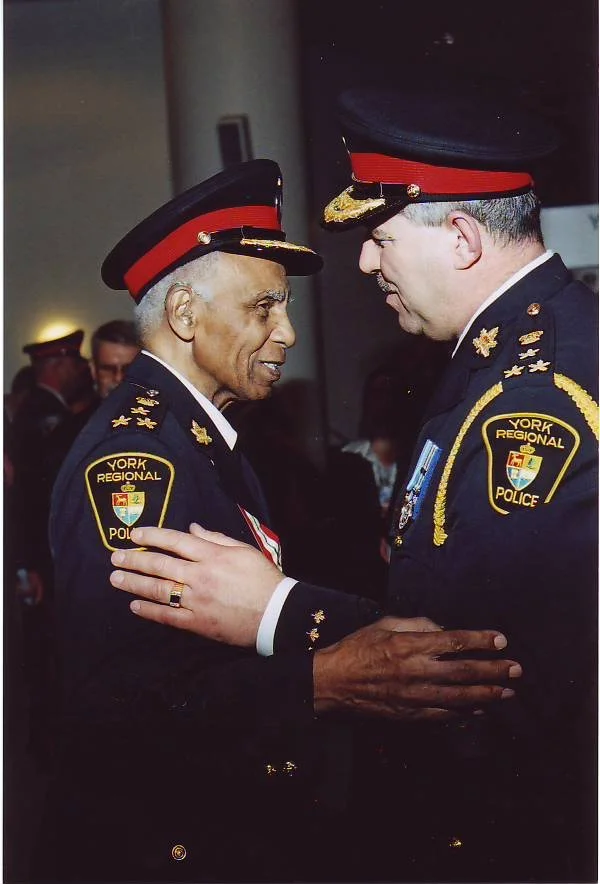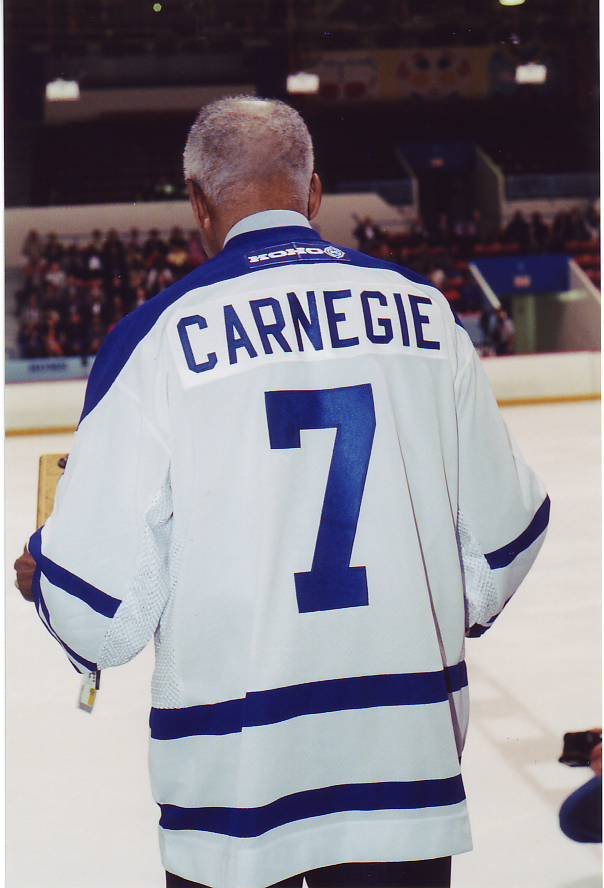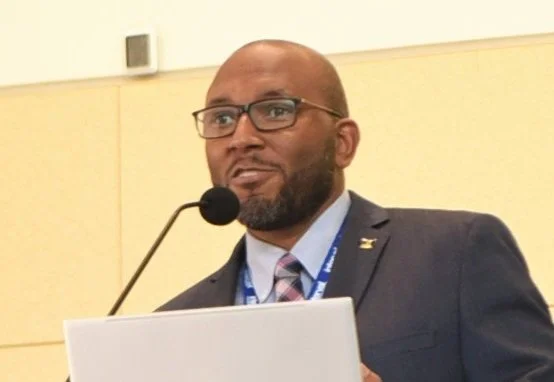Herb Carnegie finally elected to Hockey Hall of Fame
November 23, 2022
In her office last June about to jump on a Zoom meeting with other members of The Carnegie Initiative, Bernice Carnegie received a phone call from a journalist in New York asking, ‘How do you feel, how do you feel?’
“What are you talking about?” she remembered asking.
Sensing she had no clue why he called, the reporter said, ‘I hope I have not breached anything, but it was announced at 3 p.m.’
He then proceeded to read the press release that her father, Herb Carnegie, had finally been elected to the Hockey Hall of Fame (HHOF) in the Builder category, his 14th induction into a Hall of Fame.
Bernice Carnegie proudly displays the HHOF ring in the company of inductees Daniel Sedin (l), Roberto Luongo & Daniel Alfredsson (Photo by Ron Fanfair)
Still in disbelief, Carnegie’s phone started ringing off the hook.
“Rane (her nephew) was among the first to call as the announcement was broadcast on television which I could hear,” she said. “I started jumping up and down before going to my computer where I saw the note from the Hall of Fame and I called them. By the time our Zoom meeting started, everyone was beaming and clapping. I remember saying to Mike (Gartner is the HHOF Selection Committee Chair) that I feel like I want to cry and he said, ‘You are crying’.”
Those tears of joy were priceless.
Denied the opportunity to play in the National Hockey League (NHL) because of his skin colour, Herb Carnegie was at last given the spot he deserves among the sport’s greatest players.
He died in March 2012 at age 92.
How would the hockey legend have reacted to the accolade?
“My father was a very humble person,” said his daughter shortly after receiving the HHOF ring on November 11. “Every time I brought him this great news about how he was being recognized in the community, he would have this little wry smile on his face and his eyes would twinkle. That was very interesting because he was blind for the last 25 years of his life. But I could see his eyes sparkle and he would just go, ‘huh’.”
Of Carnegie’s four children, Dr. Dale Carnegie is the only sibling to see his father play the sport.
“I was 10 years old when I first saw him play in Quebec, Owen Sound and Hamilton,” the only son who played hockey up to the bantam level recalled. “He was a team player who wanted to win. He was so good at what he did. He developed his character through the sport and when he was finished playing, he used those same qualities to carry him through life to make people better.”
He said his parents deliberately didn’t tell him and his siblings about the racism their father faced in hockey.
“As children, we really never knew what he went through to accomplish what he did,” said the health care practitioner who attended university in Cleveland and was conscripted into the American Army during the Vietnam War, serving as a podiatrist at a major hospital in Colorado where he has resided the last 55 years. “It was not until I was reading the manuscript of his autobiography that I got a full understanding of what he actually had to overcome. Our parents shielded us so that we would not grow up bitter.”
Dale Carnegie received his late father’s HHOF jacket from Lanny McDonald (Photo contributed)
Despite the racism that blocked him from playing in the NHL, Herb Carnegie remained involved in the sport.
“My father had a very strong constitution,” said Bernice Carnegie who co-owns the Toronto Six women’s ice hockey team. “He was very confident about who he was, he felt loved by his family and I think all of those things really made a difference in him stick handling around all of the issues and challenges in life. I think it is all about empowering one’s self which he did very well. He reinvented himself over and over again and he wanted to make sure that others had an opportunity to grow and be the best they could.”
On Canada Day 2020, Rane Carnegie launched a petition that garnered over 15,000 signatures to get his grandfather into the HHOF.
“After the George Floyd murder, I received a lot of phone calls from my Caucasian friends asking what they can do to make this world a better place,” said the former junior hockey star who played in the Hyundai Canada HHOF Legends Classic on November 13.
“At the time, there was also a lot of talk in the hockey community about diversity and inclusivity. I started thinking about my grandfather then who was denied an opportunity to play in the NHL because of his skin colour. I felt that if people wanted to do more, here was an opportunity for them to do that by signing this petition. Our family is at peace now that my grandfather is in the Hall of Fame.”
Herb & Audrey Carnegie with grandson Rane (l) & Bromley Armstrong at a reception in February 1998 for Carnegie who was one of four Black Canadian pioneers featured on a Black History Month poster (Photo by Ron Fanfair)
NHL Commissioner Gary Bettman said Carnegie’s story inspires and infuriates.
“Though he was talented enough, Herb Carnegie never played in the NHL, he never represented his country at the World Championships or Olympic Games for reasons that are abhorrent and unacceptable,” he said at the induction ceremony on November 14. “Still, he devoted his post-playing career to growing our game. We honour Herb’s resilience and celebrate his family, particularly his daughter Bernice who has kept his candle burning bright through her educational efforts. To carry on Herb’s legacy, we must ensure that no one, no matter the colour of your skin, what you believe or where you come from, ever feels unwelcome in a rink or unwanted in hockey.”
Angela James, who was inducted into the HHOF in 2010, presented the Honoured Member plaque to Bernice and Dale Carnegie who represented the family that includes their sisters Goldie Jeanjacques and Rochelle Carnegie.
“I first began to understand Herb Carnegie’s legacy when I was growing up in North Toronto with the dreams like all Canadian kids,” said the Toronto Six General Manager who is the only Black to captain a national women’s hockey team and one of two Black women to have North American hockey arenas with their names. “We often played at Centennial Arena and one day we showed up to find the name had been changed to the Herb Carnegie Arena. Curiosity led me to discover that he was this amazing hockey player who had excelled at every level except the NHL.”
Angela James (c) presented the Honoured Member plaque to Bernice & Dale Carnegie (Photo contributed)
The product of Jamaican immigrants, Carnegie’s hockey career began on Willowdale’s frozen ponds where he and other aspiring professionals borrowed the names of stars that Foster Hewitt would describe on his ‘Hockey Night in Canada’ Saturday night broadcasts.
As an 18-year-old in 1938, he felt the pain a of racism’s sharp sting when Toronto Maple Leafs founder Conn Smythe said he would take the Black player immediately if he could find someone who could turn him White.
Carnegie often tearfully spoke of the devastating effect the racist remark had on his life, but he never allowed it to cloud his vision.
In preparation for an NHL career, he and older brother Ossie Carnegie who passed away in 1991, played in Perron in northwestern Quebec and in Timmins where they met Vincent ‘Manny’ McIntyre who died in 2011. The trio formed the Quebec Provincial Hockey League’s (QPHL) St. Francois starting forward line.
The significance of that combination known by a few names, including The Black Aces and Les Noirs, is they were the only all Black line ever signed by an organized non-Black hockey club in Canada. They played together as a line in Timmins, Shawinigan Falls and in Sherbrooke for eight years until 1949.
Herb Carnegie and his grand-daughter Tamu Bracken who recently retired from the Royal Canadian Mounted Police after 27 years. The Nova Scotia resident was in Toronto for the HHOF festivities (Photo by Ron Fanfair)
A year earlier, Carnegie turned down an offer to play in the New York Rangers minor league system because the money was less than he was making in the QPHL where he was a three-time Most Valuable Player.
“When I asked him if he regretted the decision not to join the Rangers, he said he didn’t because he had a family to think of and he needed to be close to them,” recalled grandson Darren Carnegie who resides in Colorado. “I really admired him for that.”
Carnegie and Montreal Canadiens Hall of Famer Jean Beliveau were teammates for two seasons from 1951 to 1953 with the Quebec Aces that was coached by Punch Imlach.
“He was a smooth skater, equally adept at centre or on a wing,” Beliveau wrote in in the foreword of ‘A Fly in a Pail of Milk: The Herb Carnegie Story’. ‘Herbie certainly had the talent and was very popular with the fans who would reward his great playmaking with prolonged standing ovations…It’s my belief that Herbie Carnegie was excluded from the National Hockey League because of his colour. How could the NHL scouts overlook not one, but three Most Valuable Player awards for a player on a team in a top senior league?”
A proud moment for the Carnegie family as grandchildren Brooke Chambers (l) & Darren Carnegie (r) join Bernice and Dale Carnegie at the HHOF ring ceremony (Photo by Ron Fanfair)
Carnegie retired from the sport four years before Willie O’Ree broke the colour barrier in January 1958 with the Boston Bruins.
In introducing the Future Aces Creed 66 years ago to enhance the development of young participants in the Future Aces Hockey School he and Doug Hester started in 1955 at Mitchell Field, Carnegie said, ‘In a world of rapid change, society demands a great deal from each other…When all of us move on to the unknown, may it be said that we tried to leave the world better than we found it’.
Undeterred by senseless acts of discrimination, he left a lasting legacy.
Schools around the world have adopted the Future Aces Creed that inspires parents, educators and community leaders to encourage young people to focus on virtuous qualities, including good attitude, sound ethics, service and civic responsibility.
Through a foundation bearing Carnegie’s name, hundreds of dollars of scholarships were presented to high school graduates across Canada pursuing higher education.
Many of the recipients are excelling in myriad professional fields.
In 1998, Herb & Audrey Carnegie presented a scholarship to Sojourner King who has her own law firm in Toronto (Photo by Ron Fanfair)
Hockey was not the only sport that Carnegie excelled in.
The Thornhill Golf & Country Club caddy in the late 1930s and Ontario junior runner-up in 1938 won three senior provincial titles, two Ontario Senior Champion of Champion awards and back-to-back Canadian Seniors championships in 1977 and 1978. He was also a three-time Whitevale Club and four-time Summit Golf & Country Club (SGCC) champion.
Both clubs recognized his significant contributions by inducting him into their Walls of Fame and the SGCC made him an honourary life member.
Herb Carnegie (r) was delighted to meet Lee Elder who was the first African-American golfer to play in the Masters tournament in 1975 (Photo by Ron Fanfair)
Carnegie demonstrated the same zeal he had for sport in business when he joined the Investors Group as their first Black employee in 1964. In his first year, he set a company sales record of $1,400,000 and qualified for the ‘Millionaire Club’ reserved for the elite representatives who exceeded the company’s target. He remained in the exclusive club for two decades and was inducted into the organization’s provincial Hall of Fame in 1997.
In 2004, the Investors Group established the Herbert H. Carnegie Community Service Award that honours consultants who demonstrate extraordinary long-term community service and a commitment to business excellence and client service.
Prior to joining the company where he spent 32 years, Carnegie was an Inventory Clerk at Toronto Psychiatric Hospital, an Assessment Officer with the North York Board of Education, a Supervisor with North York Parks & Recreation and Boys Club Director with Scarborough Police Youth Club.
His association with law enforcement continued when Marvel Comics, in conjunction with the Canadian Association of Police Chiefs, produced two special Spiderman editions in 1991 to provide positive messages for fans of the super hero, and York Regional Police Service appointed him its third and last Honourary Chief in 2005 (the others were Hal Jackman and Lincoln Alexander).
Honourary Police Chief Herb Carnegie with retired Chief Armand LaBarge (Photo by Ron Fanfair)
Carnegie was also an inventor, creating ‘The Carnegie System’ that was the first instructional hockey magnetic white board.
Made a member of the Order of Canada in 2003, Carnegie is in the Owen Sound International Afro-American and Canadian Sports Halls of Fame. He was also a recipient of a Harry Jerome President’s Award and an honourary doctorate from York University.
The city honoured Carnegie in 2001 by renaming North York Centennial Stadium the Herb H. Carnegie Arena and a public school in York Region bearing his name was opened in December 2008.
Herb Carnegie at the North York Centennial Stadium renaming ceremony in 2001 (Photo by Ron Fanfair)
At his 1996 Order of Ontario induction, Carnegie politely turned down a journalist’s request to be filmed without his wife of 63 years. The reporter agreed to photograph the couple, but Audrey Carnegie – who died in 2003 – was cropped out of the published photo.
Hurt and disappointed, he started the Amazing Aces Award to recognize couples.
An amazing couple…Herb & Audrey Carnegie (Photo by Ron Fanfair)
Mayor John Tory and his wife Barbara Hackett were among the recipients a decade ago.
“This is one of those rare occasions when she’s being honoured too because she has done her own share of work in addition to supporting me and raising my family while I am doing other things,” he said at the time.
To mark the trailblazer’s 103rd birthday, Tory declared November 8 ‘Herb Carnegie Day in Toronto’.
Carnegie joins Willie O’Ree, Grant Fuhr, Angela James and Jarome Iglina as the only Black HHOF members.


